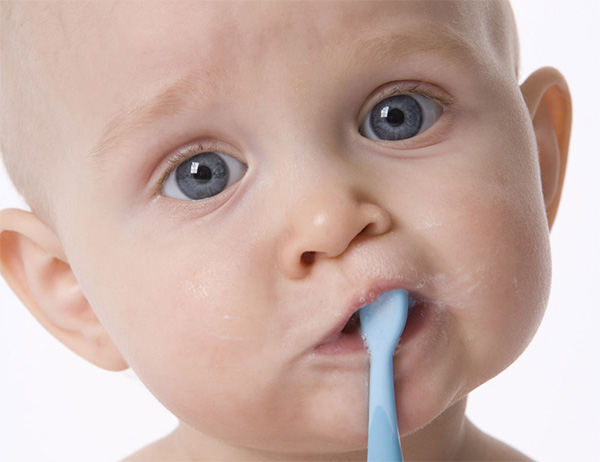Oral candidiasis, or thrush, is a condition caused by candida albicans characterized by the presence of lesions and accumulation of white deposits on the tongue or inside the cheek.
Wounds can be painful and may bleed slightly when are scraped. Sometimes thrush can spread to the palate, gums, tonsils or the back of the throat (pharynx).
Although thrush can affect anyone, it occurs most often in children and people who wear dentures, using inhalers containing corticosteroids or in those with compromised immune system.
Oral thrush is a minor problem if a person is healthy, but if the immune system is weakened, symptoms can be more severe and more difficult to control.
Symptoms
– Children and adults – may not initially observe oral candidiasis symptoms. Depending on the cause underlying the events, they can develop the condition suddenly and may persist for a while.
Symptoms include lesions with whitish deposits located inside the cheeks, tongue and sometimes the palate, gums and tonsils, pain, slight bleeding (where wounds are rubbed or scraped), cracks and redness at corners of the mouth and loss of taste. In severe cases, the lesions may spread into the esophagus, and if this happens, you may experience difficulty swallowing or feel like pieces of food are stuck in the neck.
– Infants and nursing mothers – In addition to the distinctive white lesions, newborns may have difficulties in eating, restlessness and irritability. The children can transmit the infection to their mothers while breastfeeding, and may be forwarded again from the mother’s breasts to the baby’s mouth. Women whose breasts are infected with candida may have the following signs and symptoms: unusual red and sensitive nipples, itchy skin with bright spots that one can see in the dark, unusual pain while nursing or painful nipples between meals, twinge of breasts.
Causes
Canker sores or stomatitis candidiasis may occur when the immune system is weakened by disease or some types of medication (prednisone), or when antibiotics disturb the natural balance of microorganisms in the body of a person.
Normally, the immune system rejects harmful invading organisms like viruses, bacteria and fungi, while maintaining a balance between good and bad microbes that normally live in the body of a person. However, sometimes these protective mechanisms fail, which may allow the installation of a mouth infection.
Among the diseases that predispose to the occurrence of oral candidiasis may include:
– HIV / AIDS – repeated occurrence of stomatitis candidiasis may be the first sign of HIV infection.
– Cancer – in most cases, the immune system of cancer patients is weakened by the condition itself and also by following specific treatments, which increase the risk of mouth infections such as thrush.
– Diabetes – if this untreated diabetes is not kept under control, saliva may contain large amounts of sugar, which will favor oral candidiasis.
– Fungal vaginal infections – although fungal infections are not dangerous, women who are pregnant can transmit the fungus to newborn during natural birth.
Risk factors
Any person may manifest oral candidiasis or thrush, but there are certain categories of people with a higher degree of risk. Risk factors include:
– Young age (condition is common in young children)
– Compromised immune system
– Wearing dentures
– The presence of various diseases, such as diabetes or anemia
– The use of drugs (antibiotics, oral corticosteroids or inhaled)
– After chemotherapy or radiotherapy treatment for cancer treatment
– Manifestation of conditions that can cause dry mouth (xerostomia)
– Smoking
Complications
Oral candidiasis or thrush is seldom a problem for healthy children and adults, although the infection can recur even after being treated. If a person has a weakened immune system, thrush may spread in various parts of the body, including the digestive tract, lungs and liver. Severe symptoms may appear, especially in the mouth and esophagus, which can make eating painful and difficult. The infection can spread to the intestines and absorbing of nutrients will not be done in a proper way.
If candidiasis is manifested only in the mouth, can be diagnosed by specialist simply by observation of the lesions. Sometimes it may be necessary to harvest a sample of the infected area to confirm the diagnosis.
Present in the esophagus, thrush is worse. To help diagnose this condition, your doctor may request some tests and cultures of secretions in the neck and endoscopic examination.
Treatment
Regular medical consultation aims to general health care. In the usual visits, the doctor will try to assess the risk of developing stomatitis or oral candidiasis (especially if certain risk factors are present) and will recommend the necessary investigations. These measures will help to diagnose and treat cases that could be the basis of oral candidiasis, since the early stages of the condition.
Treatment of candidal stomatitis include:
– Oral antiseptic solutions
– Diagnosis and treatment of any disease that might contribute to the occurrence of oral candidiasis (such as HIV / AIDS and diabetes)
– Eating yogurt or taking acidophilus supplements may help to balance the microorganisms in the mouth
– Management of the antifungal drugs including prescription ones such as fluconazole
– Gargle and rinse the mouth with warm water with salt
In many cases, thrush in infants may disappear within two weeks and may not require any treatment other than monitoring the evolution of lesions. Because oral candidiasis may be painful and will cause the food to be difficult, the physician should observe if symptoms worsen and to institute new measures of treatment.


